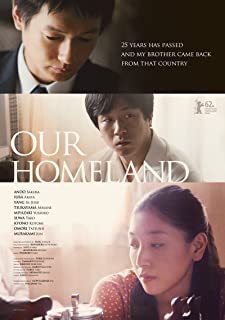電影訊息
電影評論更多影評

2012-11-26 08:13:43
有幸在SIFF訪問了梁導演
How would you describe yourself as a film-maker?
I』ve never imagined I』d be a film-maker, but after I made a documentary, people started to call me a director and I was like, OK. I was born and raised in Japan, second generation Korean; both my parents came from Jeju Island in South Korea. Even though my parents were born in South Korea, they chose North Korea as their Fatherland due to their ideology and hard experience.
After Korea became independent, they were living in Japan because during the war, they moved to Japan from South Korea. In Japan, the status for Korean people was really worse than trash: no human rights, strong discrimination. My father decided to become a human-right activist. At the time, South Korea was very politically insecure: the military government. Also, there was a severe massacre happened in Jeju Island, South Korea in 1948, and my parents lost a lot of friends and relatives: they were killed. Then my parents were like, no more South Korean government. They totally stopped believing the South and they chose the North. Though they really knew nothing about North Korea, they had great expectations.
At the time, socialism was kind of a hope for many people all over the world, maybe. Also, Kim Il-sung made a beautiful speech for Koreans in Japan. For Koreans, the South Korean government totally ignored them while North Korea kind of, played a beautiful role (as shown in Kim Il-sung's speech): if you choose North Korea as your Fatherland, we are going to give you houses, medical care, education and jobs. So why don't you come to North Korea? It's your Fatherland. And then my father totally fell in love with his speech. My father's ideology was not logical, very emotional, like mafia, Yakuza people, you know, the feelings, that he couldn't betray oyabun, the boss. But by and by, they came to know the reality of North Korea but they just couldn't deny everything in their lives and that's why they still try to believe in that country and they need to pretend to believe in the country because they have hostages: children, and grandchildren now.
But during the 60s, my father was a real activist working in a North Korean Association in Japan and he sent his sons, that is, my brothers, to North Korea, what I would say, a big mistake but at that time, more than 90, 000 Koreans living in Japan moved to NK, with big hope and dreams. It was a very political co-project by North Korea, the Jpanese Red Cross and both governments. North Korea really wanted not only people, but also money and connections; Japan wanted to kick out Korean people, for any reasons, as much as they could.
You mentioned you spent six month preparing and finished shooting the film within only two weeks. That's amazing.
Yeah (laugh). I don't know how we did it in two weeks but it was really a nightmare. Too hot, in Tokyo. And also, we really had no time. So there were moments that I really wanted to take one more, and I really had to give up so many things. The monitor was this kind of small monitor (handsign: no big than an average adult's palm) and I really couldn't see (clearly). I hope I could have a better budget, and some more time. But when I was much younger than now, at my twenties and early thirties, I was either a poor theatre play company member, or poor video journalist or something and then I became a documentary film-maker.
(But you made for New School, in 紐約!) Yeah, yeah, yeah, I was a bartender. I worked as a bartender, and also I had many many part-time jobs. When I was in Japan, it was a hard time even to get a job as a waitress with my identity or with my Korean name especially. But now I became Japanese representative for Oscar, my mom is so happy! It is really a miracle. My friends are happy with that, too. It's interesting. When my brothers were in Japan, it was really the worst time for Korean people living in Japan but now many things have changed.
Also during the film-making, maybe you and your father reconciled with each other?
Yeah. During the documentary making, I think, without a video camera, I couldn't rebuild the relationship between my father and I. When he passed away three years ago, he was really happy to hear that my documentaries started to go to many film festivals. With documentaries , too, I went to many film festivals. He really wanted me to have South Korean passport. He said that in the documentary and that's why the association didn't like it. (Laugh) He was really honest, more mentally honest in my documentary and that was thankful. My mom said being honest was his last gift for me, for my film-making. 舉報
評論

